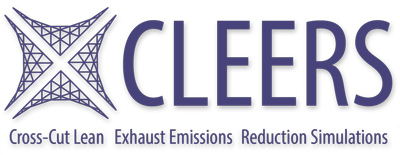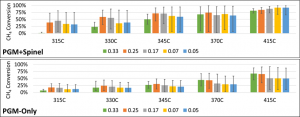Methane Oxidation on Structured Pt/Pd + Mixed Metal Oxide Spinel: Mechanistic Origins of Conversion Enhancement During Feed Modulation
Michael Harold, University of Houston
We investigate the use of structured catalytic monoliths coated with Al2O3-supported Pt-Pd and mixed metal oxide spinel for coupled CH4 oxidation and NOx reduction. A series of structured, single- or dual-layer monoliths containing Pt-Pd/Al2O3 (PGM) and Mn0.5Fe2.5O4/Al2O3 spinel (MFO) show that a combination of a lean/rich modulation and spinel addition gives enhanced methane and NO conversions compared to a time invariant feed having the same overall composition. Up to a 100 °C decrease in the methane conversion light-off temperature is obtained for an application-relevant feed (CH4 + NO + H2 + CO + O2 + H2O + CO2). In the absence of spinel, the modulation enhancement is negatively impacted at high methane conversions. Flow reactor and kinetics studies are conducted to elucidate the underlying mechanism responsible for enhanced CH4 and NOx conversion. The mechanism is linked to suppression of O2 inhibition on the methane oxidation rate near the stoichiometric neutral point. The methane oxidation rate dependence on O2 partial pressure reveals a rate maximum separating O2 adsorption limited and O2 inhibition regimes, along with multiplicity for a finite range of O2 concentration. Feed modulation between the two regimes leads to an enhanced oxidation rate. The addition of the spinel to Pt-Pd significantly enhances CH4 conversion, with the existence of an optimal modulation frequency that depends on temperature. A comparison of CH4 conversion on a Pt-Pd/Al2O3 + Mn0.5Fe2.5O4/Al2O3 dual layer catalyst compared to Pt-Pd/Al2O3 single layer catalyst shows notable enhancement over a range of modulate amplitudes and frequencies. Further, increased methane conversion during the lean-to-rich transition indicates that the role of spinel is critical in providing efficient oxidation of partial oxidation products CO and H2, both of which inhibit anaerobic CH4 reaction with H2O. Mechanistic origins of strongly nonlinear rate dependence on O2 concentration and conversion enhancement during lean-rich feed modulation will be discussed.


